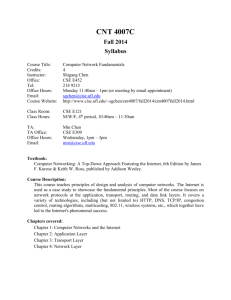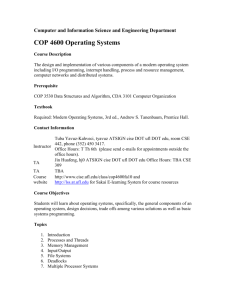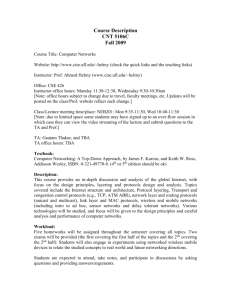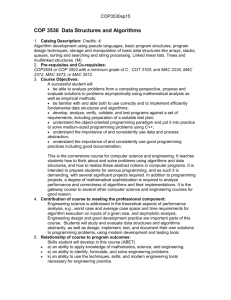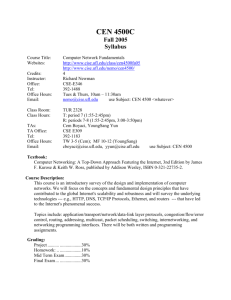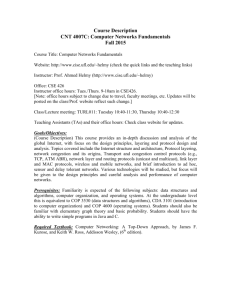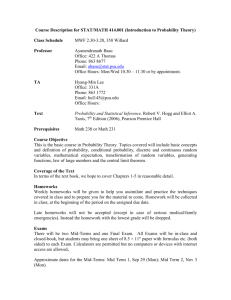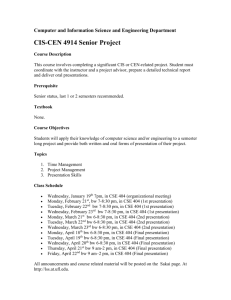doc - Department of Computer and Information Science and
advertisement
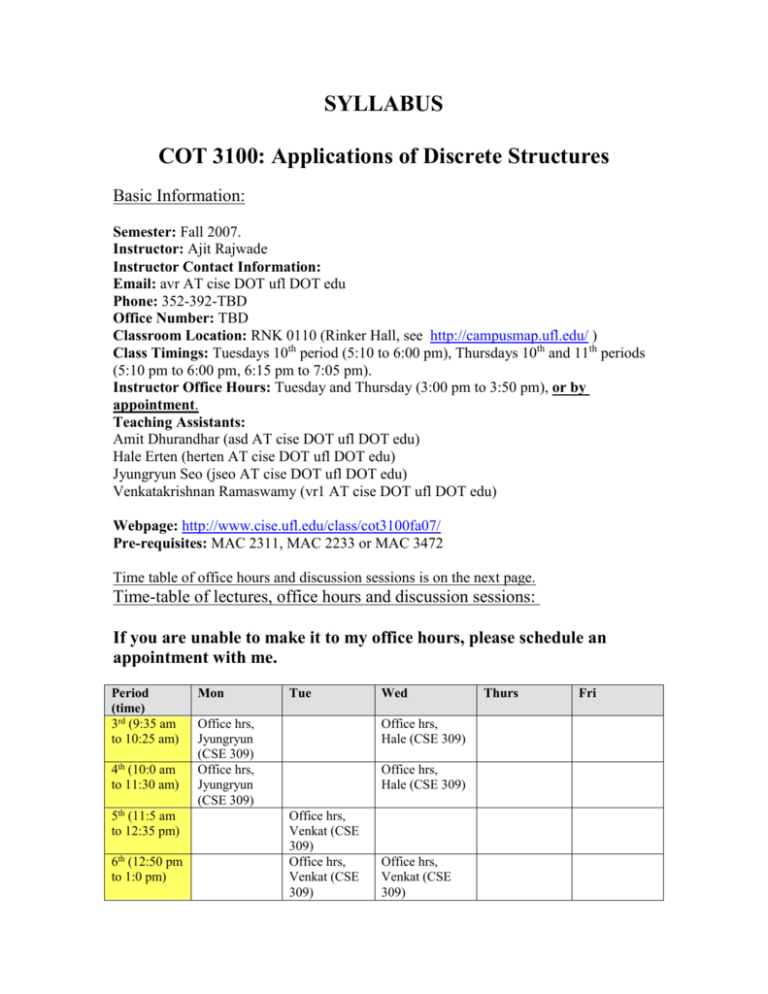
SYLLABUS COT 3100: Applications of Discrete Structures Basic Information: Semester: Fall 2007. Instructor: Ajit Rajwade Instructor Contact Information: Email: avr AT cise DOT ufl DOT edu Phone: 352-392-TBD Office Number: TBD Classroom Location: RNK 0110 (Rinker Hall, see http://campusmap.ufl.edu/ ) Class Timings: Tuesdays 10th period (5:10 to 6:00 pm), Thursdays 10th and 11th periods (5:10 pm to 6:00 pm, 6:15 pm to 7:05 pm). Instructor Office Hours: Tuesday and Thursday (3:00 pm to 3:50 pm), or by appointment. Teaching Assistants: Amit Dhurandhar (asd AT cise DOT ufl DOT edu) Hale Erten (herten AT cise DOT ufl DOT edu) Jyungryun Seo (jseo AT cise DOT ufl DOT edu) Venkatakrishnan Ramaswamy (vr1 AT cise DOT ufl DOT edu) Webpage: http://www.cise.ufl.edu/class/cot3100fa07/ Pre-requisites: MAC 2311, MAC 2233 or MAC 3472 Time table of office hours and discussion sessions is on the next page. Time-table of lectures, office hours and discussion sessions: If you are unable to make it to my office hours, please schedule an appointment with me. Period (time) 3rd (9:35 am to 10:25 am) 4th (10:0 am to 11:30 am) 5th (11:5 am to 12:35 pm) 6th (12:50 pm to 1:0 pm) Mon Tue Office hrs, Jyungryun (CSE 309) Office hrs, Jyungryun (CSE 309) Wed Office hrs, Hale (CSE 309) Office hrs, Hale (CSE 309) Office hrs, Venkat (CSE 309) Office hrs, Venkat (CSE 309) Office hrs, Venkat (CSE 309) Thurs Fri 7th period (1:55pm to 2:45 pm) 8th (3:00 pm to 3:50 pm) 9th (4:05 pm to 4:55 pm) 10th(5:10 pm to 6:00 pm) 11th (6:15 pm to 7:05 pm) OFFICE HRS (AJIT) CSE 506 OFFICE HRS (AJIT) CSE 506 LECTURE (RNK 0110) DISCUSSION (RNK 0220) DISCUSSION (RNK 0220) LECTURE (RNK 0110) DISCUSSION (RNK 0220) LECTURE (RNK 0110) Office Hours (Amit) in CSE 309 Office Hours (Amit) in CSE 309 Please see following pages for course description/policies.BASIC COURSE DESCRIPTION: The essential course theme is mathematics of discrete events or entities. The following is an overview of the course contents: (1) Elements of mathematical reasoning with a view to developing the ability to comprehend as well as write clear, correct proofs. Different proof techniques will be taught. (2) Discrete structures: These include entities such as sets, relations, graphs and trees. These entities act as very fundamental representations useful in a broad spectrum of applications across the length and breadth of computer science. (3) Basic Combinatorial Analysis: This includes the basic concepts of permutations, combinations, counting, probability and the pigeonhole principle. (4) Introduction to algorithms and time complexity. The contents of this course serve as a pillar for several applications in computer science, and provide highly useful background for subsequent courses on data structures and algorithms, theoretical computer science, as also other fields within computer science such as databases, networks, operating systems, programming languages, compilers, artificial intelligence, graphics, etc. It is important to note that this is by no means a programming course. Rather, it emphasizes mathematical reasoning. You will be expected to solve problems and write proofs just as in any typical mathematics class. GRADING: The grading will be based on two midterms (each worth 20%) and one final exam (worth 35%), homeworks (worth 10%) and in-class surprise quizzes (worth 15%). Homeworks: There will be weekly or bi-weekly homeworks assigned typically on a Thursday. The homework will be strictly due the very next Thursday BEFORE or during the first 10 minutes of class. No late homeworks will be accepted and there are no electronic submissions. Also, the solutions will be posted immediately after the due time. All homeworks must be turned in on paper with the student’s name and section number written clearly on it. Depending on the exact number of homeworks, your lowest or lowest two scores will be dropped. All homeworks are weighted equally. Quizzes: There will be surprise in-class quizzes, almost every week, all weighted equally. Your lowest two scores will be dropped. Exams: The two mid-terms will be in-class (closed books, closed notes, but you are allowed a two-sided A4 sized cheat-sheet on which you can write down your favourite formulae). The mid-terms will be two hours long each. Midterm exams are scheduled to be in class during normal class time. The final exam will be held during the official final exams week. The final exam is scheduled during the period 10F. For policies on make-up exams, please see the section on COURSE POLICIES. Grading Scale: The final grading scale will be an ‘A’ (90 and above), a ‘B+’ (85 and above, less than 90), a ‘B’ (80 and above, less than 85), a ‘C+’ (75 and above, less than 80), a ‘C’ (70 and above, less than 75) and a ‘D’ (60 and above, but less than 70). I might be more lenient and decide to use a curve. COURSE TEXTBOOK: The official textbook for the course will be the SIXTH edition of “Discrete Mathematics and its Applications” by Kenneth Rosen, McGraw Hill 2006. A fifth edition of this book is also available; however the homework assignments will be based primarily on the sixth edition of the book. Hence, it is ENTIRELY your responsibility to locate the appropriate topics or exercises should you choose to use the fifth edition of the book. No excuse regarding any confusion on this matter will be entertained. Please note that STUDENTS’ SOLUTIONS to selected exercises are also available for this book. Feel free to use them, though it is obviously recommended that you attempt to solve all problems yourself first for your own practice instead of rushing to look at available solutions. Links to the book: http://www.amazon.com/Discrete-Mathematics-Applications-KennethRosen/dp/0073312711/ (Make sure you purchase the correct edition of the book, i.e. the SIXTH edition) http://highered.mcgrawhill.com/sites/0072880082/information_center_view0/table_of_contents.html Published Errata: http://highered.mcgraw-hill.com/sites/dl/free/0072880082/299357/Rosen_errata.pdf Over and above this there exist several other books on discrete mathematics, such as “How to Solve It” by Polya. However the assigned textbook provides all required material in great depth and detail. TENTATIVE LIST OF TOPICS: (Exact section numbers from the book will be announced later) (1) Propositional and predicate calculus with proof techniques (2) Basic Set theory (3) Sequences (4) Functions (5) Basic Algorithms (6) Algorithms involving operations on integers (time permitting) (7) Mathematical Induction (8) Recursion and basic recurrences (9) Permutations and Combinations (10) Basic probability (11) Relations (12) Graphs and graph algorithms (13) Trees (time permitting) COURSE POLICIES: Regrading: You are free to discuss any concerns regarding grading with me or the TAs but verbal discussion will not lead to any alteration in your grades. You need to submit a written request on a separate sheet of paper attached to your answer sheet clearly stating the reason for your request, either to me or to one of the TAs. This is true for exams, quizzes and homeworks. On no account, should you write or make absolutely any changes whatsoever on the answer sheets. All regrade requests must be made WITHIN ONE WEEK from the time the graded answer sheets are distributed to the class. Make-up Exams: There will be no make-up quizzes at all under any circumstances. Make-up midterms and final exams will be given only if you provide official documentation for a VALID EXCUSE which must be submitted to me PRIOR TO the exam. In the absence of such documentation, please do not ask for any make-up exams. Homework policy: No late homeworks will be accepted except in the case of medical problems that span the entire period starting from the day the homework was assigned till the day that it was due. Official documentation such as a doctor’s certificate is absolutely required in all such cases. Attendance: I will not be taking any attendance during class or any of the discussion sessions, but it is your responsibility to ensure that you are abreast of all the material taught in class. Cell-phones: All cell-phones must be OFF throughout class. No calls or messaging are allowed while in class. Chatting or web-browsing on laptops is also strongly discouraged. Announcements: Please go through the class website from time to time regarding any updates or announcements. It is your responsibility to ensure that you check the website frequently enough. The class website is: http://www.cise.ufl.edu/class/cot3100fa07/ Honesty policy: All students admitted to the University of Florida have signed a statement of academic honesty committing themselves to be honest in all academic work and understanding that failure to comply with this commitment will result in disciplinary action. This statement is a reminder to uphold your obligation as a UF student and to be honest in all work submitted and exams taken in this course and all others. The following link contains more information on this matter: http://www.dso.ufl.edu/judicial/ Accommodation for Students with Disabilities: Students requesting classroom accommodation must first register with the Dean of Students Office. That office will provide the student with documentation that he/she must provide to the course instructor when requesting accommodation. UF Counseling Services: Resources are available on-campus for students having personal problems or lacking clear career and academic goals. The resources include: - University Counseling Center, 301 Peabody Hall, 392-1575, Personal and Career Counseling. - SHCC mental Health, Student Health Care Center, 392-1171, Personal and Counseling. - Center for Sexual Assault/Abuse Recovery and Education (CARE), Student Health Care Center, 392-1161, sexual assault counseling. - Career Resource Center, Reitz Union, 392-1601, career development assistance and counseling.
